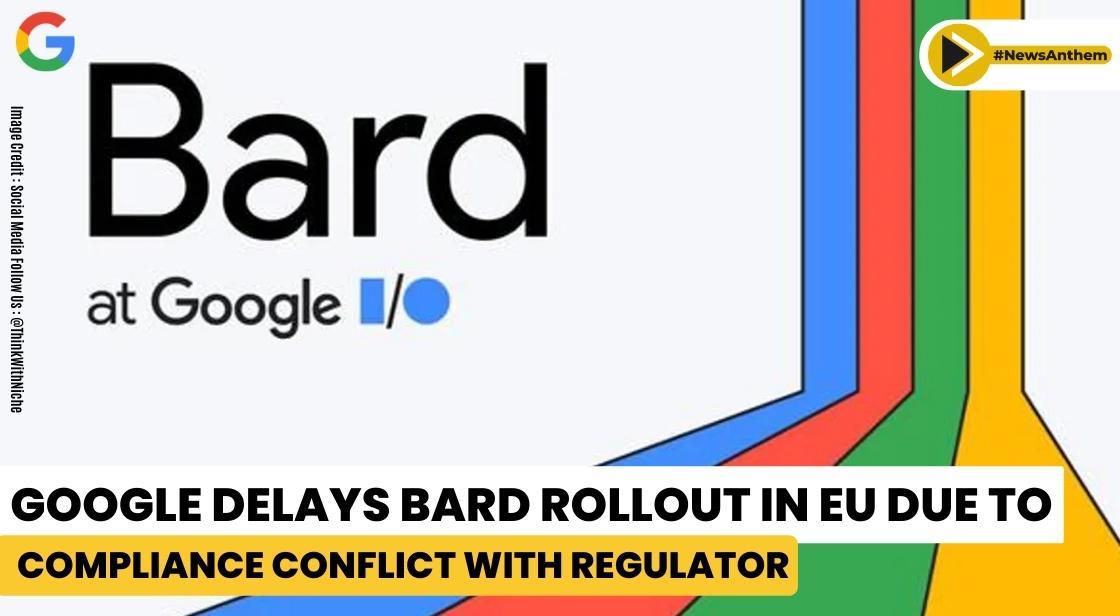Google Delays Bard Rollout in EU Due to Compliance Conflict with Regulator

News Synopsis
Google's Bard Rollout in EU Faces Postponement Amid Compliance Concerns
Google's plans to introduce its AI chatbot, Bard, in the European Union have been delayed due to compliance issues raised by the EU's top data watchdog. The search engine giant had originally intended to launch Bard last week in the EU, but concerns regarding compliance with EU data protection rules led to the decision to postpone the rollout.
Google's Initial Delay and Focus on Generative AI Potential
One factor contributing to the delay in Bard's rollout is Google's initial underestimation of the potential of generative AI. As the company recognized the significance of this technology, it prioritized working on harnessing the possibilities of Generative AI alongside its rival, ChatGPT. The competition between OpenAI and Google in this field has intensified as both companies seek to revolutionize AI chatbots and conversational AI tools.
Compliance Conflict with the EU's Data Protection Rules
The main reason for Google's postponement of Bard's rollout in the EU is the company's inability to outline how it would comply with the EU's data protection rules. The Irish Data Protection Commission, responsible for overseeing the General Data Protection Regulation in the EU, raised concerns regarding data usage and transmission. Google has engaged in discussions with the commission and provided the necessary information to address their questions.
Google's Engagement with Privacy Regulators
Google emphasizes its commitment to responsible deployment and engagement with experts, regulators, and policymakers. The company has been actively engaging with privacy regulators to address their questions and seek feedback.
The goal is to ensure compliance with data protection regulations while making Bard widely available, including within the EU.
Competitive Landscape and EU's Scrutiny of Generative AI
The delay in Bard's rollout coincides with the competitive rivalry between Google and ChatGPT. Both companies are actively exploring the possibilities of Generative AI. While Google aims to revolutionize AI chatbots and expand their usage to over 180 countries, the EU remains vigilant about the adoption of such technologies and their potential impact on member states.
Why the Postponement Matters
The postponement of Bard's rollout in the EU is a setback for Google, which has been competing with OpenAI's ChatGPT for dominance in the AI chatbot market. ChatGPT is already available in the EU, and it is possible that Google's delay will give OpenAI a chance to further solidify its lead.
The postponement is also a sign that the EU is taking a tough stance on data privacy. The GDPR is one of the strictest privacy laws in the world, and it has been praised by privacy advocates. However, the law has also been criticized by some businesses, who say that it is too burdensome.
What's Next?
It is unclear when Google will be able to launch Bard in the EU. The company has said that it is working with the DPC to address its concerns, but it is not clear how long this process will take.
In the meantime, OpenAI will likely continue to gain market share in the AI chatbot market. The company has said that it plans to launch ChatGPT in more countries in the coming months.
Conclusion
Google's decision to postpone the rollout of its AI chatbot, Bard, in the EU is a result of compliance concerns raised by the EU's data watchdog. The company's commitment to addressing these concerns and complying with EU data protection rules reflects its dedication to responsible deployment.
As Google and its competitors, like ChatGPT, vie to unlock the potential of Generative AI, the EU maintains a watchful eye on the adoption of such technologies and its implications for member states' privacy and data protection.
You May Like









